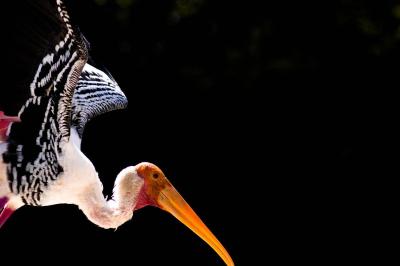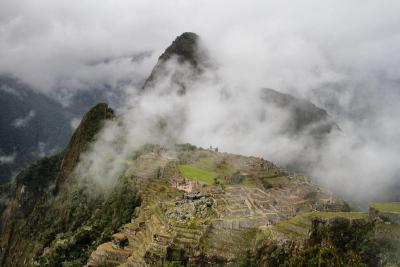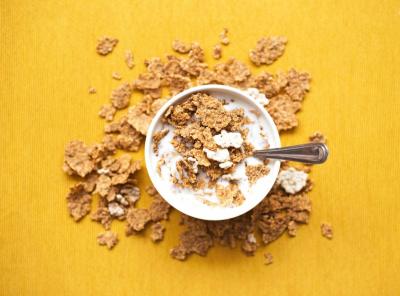Qing Ming Jie(All Souls' Day)
Qing Ming is a time to remember the dead and the dearly departed.More important,it is a period to honour and to pay respect to one's deceased ancestors and family members.Because it reinforces the ethic of filial piety,Qing Ming is a major Chinese festival.
Literally meaning "clear" (Qing) and "bright" (Ming),this Chinese festival falls in early spring,on the 106th day after the winter solstice.It is a "spring" festival,and it is an occasion for the whole family to leave the home and to sweep the graves of their forebears.Chinese being practical people this sweeping of the graves is given an extended period,that is,10 days before and after Qing Ming day.Among some dialect groups a whole month is allocated.
清明节是一个纪念祖先的节日.主要的纪念仪式是扫墓,扫墓是慎终追远、郭亲睦邻及行孝的具体表现;基于上述意义,清明节因此成为华人的重要节日.清明节是在仲春和暮春之交,也就是冬至后的106天.扫墓活动通常是在清明节的前十天或后十天.有些地域的人士的扫墓活动长达一个月.
清 明 节(Tomb-Sweeping Day)
1、Qing Ming Jie(All Souls' Day)
Qing Ming is a time to remember the dead and the dearly departed. More important, it is a period to honour and to pay respect to one's deceased ancestors and family members. Because it reinforces the ethic of filial piety, Qing Ming is a major Chinese festival.
Literally meaning "clear" (Qing) and "bright" (Ming), this Chinese festival falls in early spring, on the 106th day after the winter solstice. It is a "spring" festival, and it is an occasion for the whole family to leave the home and to sweep the graves of their forebears. Chinese being practical people this sweeping of the graves is given an extended period, that is, 10 days before and after Qing Ming day. Among some dialect groups a whole month is allocated.
清明节是一个纪念祖先的节日。主要的纪念仪式是扫墓,扫墓是慎终追远、郭亲睦邻及行孝的具体表现;基于上述意义,清明节因此成为华人的重要节日。 清明节是在仲春和暮春之交,也就是冬至后的106天。扫墓活动通常是在清明节的前十天或后十天。有些地域的人士的扫墓活动长达一个月。
ORIGIN(起源)
Qing Ming is popularly associated with Jie Zi Zhui, who lived in Shanxi province in 600 B.C. Legend has it that Jie saved his starving lord's life by serving a piece of his own leg. When the lord succeeded in becoming the ruler of a small principality, he invited his faithful follower to join him. However, Jie declined his invitation, preferring to lead a hermit's life with his mother in the mountains.
Believing that he could force Jie out by burning the mountain, the lord ordered his men to set the forest on fire. To his consternation, Jie chose to remain where he was and was burnt to death. To commemorate Jie, the lord ordered all fires in every home to be put out on the anniversary of Jie's death. Thus began the "cold food feast", a day when no food could be cooked since no fire could be lit.
The "cold food" festival occurs on the eve of Qing Ming and is often considered as part of the Qing Ming festival. As time passes, the Qing Ming festival replaced the "cold food" festival. Whatever practice is observed,the basic observation of Qing Ming is to remember one's elders by making a special effort to visit their graves, ashes or ancestral tablets. To make the visit even more meaningful, some time should be spent to remind the younger members of the family of the lives and contributions of their ancestors, and the story of Jie Zi Zhui who choose death over capitulation.
谈到清明节,有点历史知识的人,都会联想到历史人物介子椎。据历史记载,在两千多年以前的春秋时代,晋国公子重耳逃亡在外,生活艰苦,跟随他的介子椎不惜从自己的腿上割下一块肉让他充饥。后来,重耳回到晋国,作了国君(即晋文公,春秋五霸之一),大事封赏所有跟随他流亡在外的随从,惟独介子椎拒绝接受封赏,他带了母亲隐居绵山。
晋文公无计可施,只好放火烧山,他想,介子椎孝顺母亲,一定会带着老母出来。谁知这场大火却把介子椎母子烧死了。为了纪念介子椎,晋文公下令每年的这一天,禁止生火,家家户户只能吃生冷的食物,这就是寒食节的来源。
寒食节是在清明节的前一天,古人常把寒食节的活动延续到清明,久而久之,清明取代了寒食节。拜介子椎的习俗也变成了清明扫墓的习俗了。无论以何种形式纪念,为了使纪念祖先的仪式更有意义,我们应该让年轻一代的家庭成员了解先人过去的奋斗历史,当然,还要学习介子椎宁死不屈的气节。
2、清明节风俗
1) 扫墓
清明时节祭扫祖坟(俗称"上坟")。无锡的传统民俗较有代表性。扫墓时要挑些新士壅坟茔,而且凡新坟一定要在清明前祭扫,旧坟可以过清明.但不能过立夏。新媳妇一定要去祭扫祖坟,俗称"上花坟"。扫墓时用荤、素菜肴和酒、饭等祭奠。后用干果糕点等替代。 时至今日,在烈士陵园缅怀革命先烈成为清明节里很重要的内容,在祭炎黄二祖、悼念自己的先祖的同时,缅怀先烈的丰功伟绩,使今天的清明活动具有了更重要的教育意义。
2) 踏青
清明时节,气候温暖和煦,大地皆春,处处鲜花嫩草,一片生机盎然,人们纷纷外出踏青。在无锡,踏青的最好场所莫过于惠山。不上惠山的,上城墙绕城而走,叫登高踏青。东门东林庵一带,为士女聚集处,故有"东林庵里看桃花"的说法。这天,也是东乡胶山和北乡斗山的节场,附近还有赛会,故斗山别名清明山。人们都上山踏青,赶节场,观看赛会。从元宵节至清明节,大人孩子,三五成群,到野外放凤筝,别有情趣。
3) 门旁插柳和戴柳枝帽
清明节那天,有家家门口插柳条的风俗。在一些地区,还流行小孩带柳枝帽的风俗。
门旁插柳和戴柳枝帽习俗的来源也是根据介子椎的传说。据说,介子椎是死在柳树下面的。介子椎死后的第二年晋文公率领群臣到绵山致祭,一行人先在山下寒食一日,第二天才上山。那棵柳树,已经长出了翠绿的嫩条。晋文公看了,心中忽有所感,便走上前去,掐了一丝,编成一个圈儿带在头上。随从的臣下看了,也纷纷仿效他折柳插头。晋文公便把这棵柳树赐名为清明柳,把这一天定为清明节。
3、清明与节气
清明节即是节气又是节日。从节气上来说,它是24节气之一。
我国2000多年前的秦汉时期已基本形成了24节气。24节气综合了天文学和气象学等方面的知识,编排了"春雨惊春清谷天,夏满芒夏暑相连。秋处露秋寒霜降,冬雪雪冬小大寒"的歌谣。其中清明被排在歌谣的第五位。也是农历历法中的第五个节气。
此时,天气转暖,大地回春,万物复苏,一片生机盎然,家家门口插柳条,祭扫坟墓和郊外踏青。农谚中也有"清明忙种粟"的说法。作为以花信为标志的花信风。清明的花期为一侯桐花,二侯麦花,三侯柳花,充分点明了清明节气的花期和花种。《岁时百问》说"万物生长此时,皆清洁而明净,故谓之清明"。
参考资料:http://www.baidu.com/s?lm=0&si=&rn=10&ie=gb2312&ct=0&wd=Tomb%2Dsweeping+Day&pn=10&cl=3
Tomb-sweeping day, a traditional Chinese festival, falls at the turn of mid-spring and late spring.
(清明节,中国传统节日,又称踏青节、行清节等,节期在仲春与暮春之交。)
Tomb-sweeping day originated from ancestral beliefs and Spring Festival customs in ancient times.
(清明节源自上古时代的祖先信仰与春祭礼俗,兼具自然与人文两大内涵。)
It is both a natural solar term and a traditional festival.
(既是自然节气点,也是传统节日。)
Tomb-sweeping day is a big traditional Spring Festival.
(清明节是传统的重大春祭节日。)
It is a fine tradition of the Chinese nation since ancient times.
(是中华民族自古以来的优良传统。)
扩展资料
清明节习俗:
1、踏青
中华民族自古就有清明踏青的习俗。踏青古时叫探春、寻春等,即为春日郊游,也称“踏春”。一般指初春时到郊外散步游玩。
2、植树
清明前后,春阳照临,春雨飞洒,种植树苗成活率高,成长快。因此,就有清明植树的习惯,有人还把清明节叫作“植树节”。植树风俗一直流传至今。清明节植树的习俗,据说发端于清明戴柳插柳的风俗。
参考资料来源:百度百科-清明节

The Qingming Festival, also known as the "Ta Qing Festival", "Xing Qing Festival", "March Festival" and "Sacrifice to the Ancestors", is a grand traditional festival of Spring Festival of the Chinese nation. It belongs to a traditional cultural festival of cautious pursuit.
respecting the ancestors and promoting filial piety. There are many customs in Qingming Festival. There are differences in contents or details of Customs in different regions and cultures.
Although customs vary from place to place, tomb sweeping and ancestor sacrifice and outing in Qingming are the common basic themes of customs.
Qingming Festival is one of the 24 special festivals in the ancient Ganzhi Calendar, which expresses the seasonal changes. It is in the period of vigor and vitality, and it is also the period of Yin and Qi recession.
At this time, everything is clean and new, and the Earth presents the image of spring and bright. Qingming Festival integrates solar terms and folklore, which is the unity of the time, the place and the people.
The etiquette and custom culture of the Qing and Ming Dynasties fully embodies the Chinese ancestors'thought of pursuing the harmony and unity of heaven, earth and man, paying attention to adapting to the times and the earth and following the natural law.
清明节又称踏青节、行清节、三月节、祭祖节等,是中华民族传统的隆重盛大的春祭节日,属于慎终追远、礼敬祖先、弘扬孝道的一种文化传统节日。清明节习俗甚多,全国各地因地域文化不同而又存在着习俗内容上或细节上的差异,各地习俗虽不尽相同,但扫墓祭祖、踏青郊游是共同基本礼俗主题。
清明节气是上古干支历法中表示季节变迁的廿四个特定节令之一,处在生气旺盛的时节,也是阴气衰退的时节。这一时节吐故纳新、万物皆洁齐,大地呈现春和景明之象。清明节将节气与民俗融为一体,是天时地利人和的合一。清明礼俗文化充分体现了中华民族先祖追求“天、地、人”的和谐合一,讲究顺应天时地宜、遵循自然规律的思想。
The Qingming (Pure Brightness) Festival is one of the 24 seasonal division points in China, falling on April 4-6 each year. After the festival, the temperature will rise up and rainfall increases. It is the high time for spring plowing and sowing. But the Qingming Festival is not only a seasonal point to guide farm work, it is more a festival of commemoration.
The Qingming Festival sees a combination of sadness and happiness.
This is the most important day of sacrifice. Both the Han and minority ethnic groups at this time offer sacrifices to their ancestors and sweep the tombs of the diseased. Also, they will not cook on this day and only cold food is served.
The Hanshi (Cold Food) Festival was usually one day before the Qingming Festival. As our ancestors often extended the day to the Qingming, they were later combined.
On each Qingming Festival, all cemeteries are crowded with people who came to sweep tombs and offer sacrifices. Traffic on the way to the cemeteries becomes extremely jammed. The customs have been greatly simplified today. After slightly sweeping the tombs, people offer food, flowers and favorites of the dead, then burn incense and paper money and bow before the memorial tablet.
In contrast to the sadness of the tomb sweepers, people also enjoy hope of Spring on this day. The Qingming Festival is a time when the sun shines brightly, the trees and grass become green and nature is again lively. Since ancient times, people have followed the custom of Spring outings. At this time tourists are everywhere.
People love to fly kites during the Qingming Festival. Kite flying is actually not limited to the Qingming Festival. Its uniqueness lies in that people fly kites not during the day, but also at night. A string of little lanterns tied onto the kite or the thread look like shining stars, and therefore, are called "gods lanterns."
The Qingming Festival is also a time to plant trees, for the survival rate of saplings is high and trees grow fast later. In the past, the Qingming Festival was called "Arbor Day". But since 1979, "Arbor Day" was settled as March 12 according to the Gregorian calendar.
清明节的英语作文、清明节的英语作文,就介绍到这里啦!感谢大家的阅读!希望能够对大家有所帮助!

做比萨好词好句,急∽ 披萨好,披萨秒,大家都来学披萨,好吃有健康 表示披萨很好吃的成语 1、珍馐美馔拼音:[zhēn xiū měi zhuàn]基本解释:珍贵而味道好的饮食,亦作“珍羞美味”。分开解释:①馐:滋味好的食物,好吃的食物;②馔...

介绍一个民间故事作文300字 介绍一个民间故事作文:狄青是宋朝的一员大将,他出身低微,脸上一直留着当士兵时刺下的符号。当时,仁宗皇帝说,你已经是朝廷大将了,可以把脸上的印记去掉。但狄青不肯,说是留着它可以激励土气!一次,狄青带大军出征侬智高...

形容婆婆非常好的句子哪些 1、我的婆婆就是这样一位善良、慈爱、无私奉献的长辈。作为儿媳的我,为今生能遇到这样一位,象亲生母亲一样疼爱呵护自己的好婆婆感到幸运,这是上天赐予我的缘份,赐予我的福份啊!如果真的有来生,我还甘愿做婆婆的儿媳妇。2、...

祝老夫妻幸福的话 祝福两老白头偕老!永结同心!延年益寿!健康长寿! 赞美晚年生活的诗或者老人的诗 赞美晚年生活的诗或者老人的诗有:东晋·陶渊明《饮酒》、魏·曹操《龟虽寿 》 、唐·孟浩然《题大禹寺义公禅房》、唐·王维《夏日过青龙寺谒操禅师》...

鼓励员工风雨无阻的出勤的话语 迟到毁一生,早退穷三代,二者皆不沾,必成高富帅 风雨无阻下句是什么 风雨无阻是一个汉语成语,并无特定的上下句。风雨无阻意思是不受刮风下雨的阻碍。比喻做事没有阻碍,畅通无阻。出自明代冯梦龙《醒世恒言·黄秀才徼灵玉...

最近有一个鲜为人知的事情,那就是我有了个师傅。师傅是很优秀的,虽然只是三年级的。但是在作业帮比很多人混的都要好,粉丝就像脱缰的野马,速度只增不减。张三坐不住了,说:“不要看粉,要看实力!”其实啊,师傅也是很有实力的,每次审稿的排名都在前列。...

“天地浩大,任我倾注豪赌。江山沉浮,独独与你棋局满盘皆输。纵有万人举樽贺,我的杯却为你而空。秦时明月,唐风宋韵,都想拿来为你环佩叮咚。这锦绣河山,怎敌有你,百媚千红。”我是山海的君王鱼虾由四方赶来朝拜飞禽走兽皆慕名而来予我大海的蔚蓝与深山的...

老师,这个职业让我们这些莘莘学子真是又敬佩又敬畏,尤其是我们班的那一位老师,真让我们又爱又恨。他在上课时的那种威严,犹如古代的君主一般,而我们只是可怜的被“镇压”的份了。是不是觉得有点太夸张了呢?那就来听听我们的“血泪史”吧!班主任——秦始...

巨大的落地窗,将阳光布满这个小小的休息室,透明的玻璃茶几上,白色的棉花糖无规则地散落着,可又像一种字符。慵懒地坐在沙发上的你,背后是和煦的阳光,你被阳光紧紧包裹着。你扬起的嘴角,弯着的眼眸,桀骜不驯的白色头发,你比阳光更加刺眼;突然张开的双...

秦始皇,在下最敬佩的历史人物之一,世人皆道他是个暴君,可是在下却不这么觉得。世人皆道呀,秦始皇残暴昏庸又无能,但,如果不修建长城,匈奴就会闯进来,杀光这里的百姓,到时候生灵涂炭,那又该如何?你说为什么他不去争召呢?因为他明白,没几个人会为国...

秋游作文500字 秋天是迷人的,大雁南归、枫叶似火、硕果累累。秋天的美别具一格,秋天的美实实在 游在。校趁着这个美好的时光组织同学们去秋游。 一想到能够去秋游,我高兴得不知道怎么形容,怀着特别激动的心情为秋游作好准备...

小学生奇妙的想象作文120个字 有一天,我发明了一件宝贝,是一个机器人,名叫作业机器人。因为这些天作业很多,很多人写不完,常常被老师批评,所以我就发明了这个作业机器人。这个机器人很神奇,只要你输入你的字体,再把作业打开那一页,然后放到机器人...

我心情不好,我想在QQ上发说说,谁帮我想个内涵的说说! 1、总有一天你会明白,人首先要爱自己。我没有办法一无所有的爱你2、只是因为太年轻,所以所有的悲伤和快乐都显得那么深刻,轻轻一碰就惊天动地。3、在这个城市,做一道路过的风景,做一次匆匆的...

作文:秋天的田野 不知道要多少字的,下面这个600字,参考一下吧秋天到了,“秋高气爽,望断南飞燕。”秋天是金色的,是红色的,也是丰收的。秋天,稻谷丰收、苹果丰收、蔬菜丰收……,咦,我想你们很久没有到田野去过吧,让我带你们一起去参观吧。远远的...